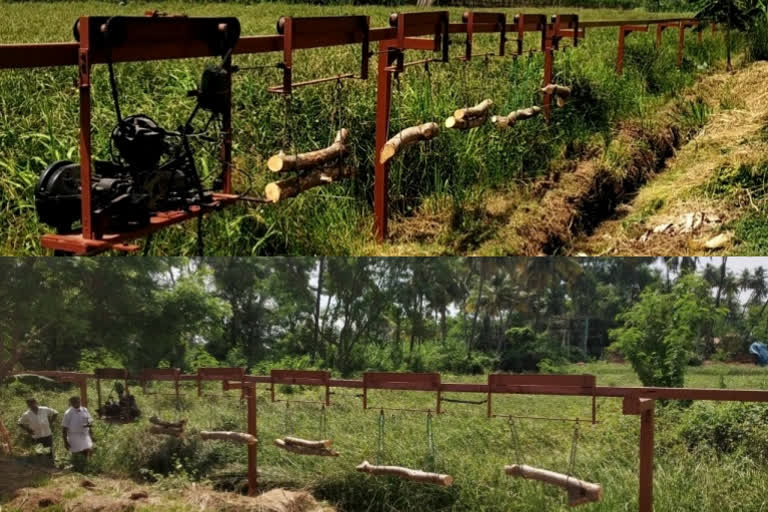Hyderabad: Indian Institute of Technology Madras (IIT Madras) researchers, collaborating with a farmers' NGO, have developed a unique, efficient and cost-effective agricultural transportation system that addresses labour shortage, a major issue faced by Indian farmers. This lightweight monorail-type transportation system can economically carry agricultural produce from the fields to collection points near the farmlands. An IIT Madras team, along with ‘Pothu Vivasayeegal Sangam,’ a Non-Governmental Organisation for farmers, has successfully tested this prototype cableway system at a farm in Nanjai Thottakurichi village of Karur district in Tamil Nadu.
Shortage of manpower for farming activities is one of the major issues plaguing the Indian farming system. This problem especially grows severe during the post-harvest period when significant manpower is required to transport agricultural produce (such as sugar cane, banana bunches, or paddy) from the field to a nearby collection point. The problem becomes especially acute in wetland farms, where labourers find it difficult to travel across waterlogged land with headloads. This transportation system developed by Prof. Shankar Krishnapillai from the Department of Mechanical Engineering at IIT Madras, collaborating with the farmers' NGO, provides an economical and simple solution to this problem.
Highlighting the unique features of this transportation system, Prof. Shankar Krishnapillai, Department of Mechanical Engineering, said, “Indian farmers will face severe shortage of labour in the coming years, especially in post-harvest operations. The simple agricultural transportation system is made in local workshops, from locally available components, based on the lightweight overhead rail concept. It can be easily installed on Indian farms and reduce labour requirements in transporting the produce. The system has also minimal environmental disturbance as it passes over the ground”.
While explaining how the transportation system can be scaled to farms across the country, Prof. Shankar Krishnapillai, said, “The proposed agricultural system is based on the very simple design concept and components, and easy to be implemented in any local farm. Additional rails and posts can be easily added and the range can be scaled up to over a kilo metre. Also in future, the trolleys can be powered by a battery power pack charged by solar energy."
Also read: IIT Roorkee Researchers discover three antiviral molecules for treating COVID-19/SARS-COV2 virus
The Advantages of deploying the proposed transportation system include:
- Provides an easy and economical solution to the issue of manpower shortage in farming activities. It is estimated that in a traditional manual head load carrying method, a small farm could employ 32 people every day to carry the agricultural produce to collection points. But, with the deployment of this transportation system, the number of farm workers could be reduced to four to do the same work.
- The transportation system also helps in avoiding the issue of bruising of fruits, which is mainly caused when crops are manually carried overhead to collection points. For instance, there is a significant economic loss incurred by farmers due to the bruising of bananas because of manually carrying the crop to the collection points.
- The deployment of this transportation system has a minimal environmental impact as it requires only minimal space to erect the system, and does not disturb the vegetation over which it passes.
- This transportation system requires a low operation cost due to relatively lower-energy consumption due to moving over the rail and requires only 2 persons to operate it, one at each end.
Demonstration: This transportation system is of a simple indigenous design, consisting of steel posts erected on concrete shoes placed along the edge of the farm. High-strength, but lightweight rails connect these posts with a span of six metres, and a traction unit powered by a petrol engine propels several trolleys carrying the agricultural loads back and forth.
Each trolley can carry a load of about forty kg, which is equal to a headload. Rails can be readily added to cover any desired distance. All components are made in local workshops using easily available indigenous components. This transportation system was installed on the farmland of Mr T.N. Siva Subramanian, President of Pothu Vivasayeegal Sangam in Nanjai Thottakurichi village of Karur district of Tamil Nadu. The system was erected through Corporate Social Responsibility funds from M/S Cholamandalam Insurance.
Speaking on how the transportation system would help in solving the issues faced by farmers, Mr Siva Subramanian said, “This agricultural transport system is useful specifically for farmers who cultivate crops along the riverbanks. For instance, many farmlands in the Karur region are directly irrigated by the canals of the Cauvery river. As a result, it becomes extremely difficult for labourers to carry produce through these wetlands. The agricultural transportation system helps to address this issue. “
The IIT Madras team, led by Prof. Shankar Krishnapillai, along with the NGO, conducted continuous trials covering a distance of about 200 metres for several months from July 2020 with five loaded trolleys. Two people were required to operate the system, one at either end of the transportation system. The trials showed that they were able to successfully transport agricultural loads in a consistent and reliable manner. The components of the cableway can be manufactured at local workshops, making it a fully indigenous system.



